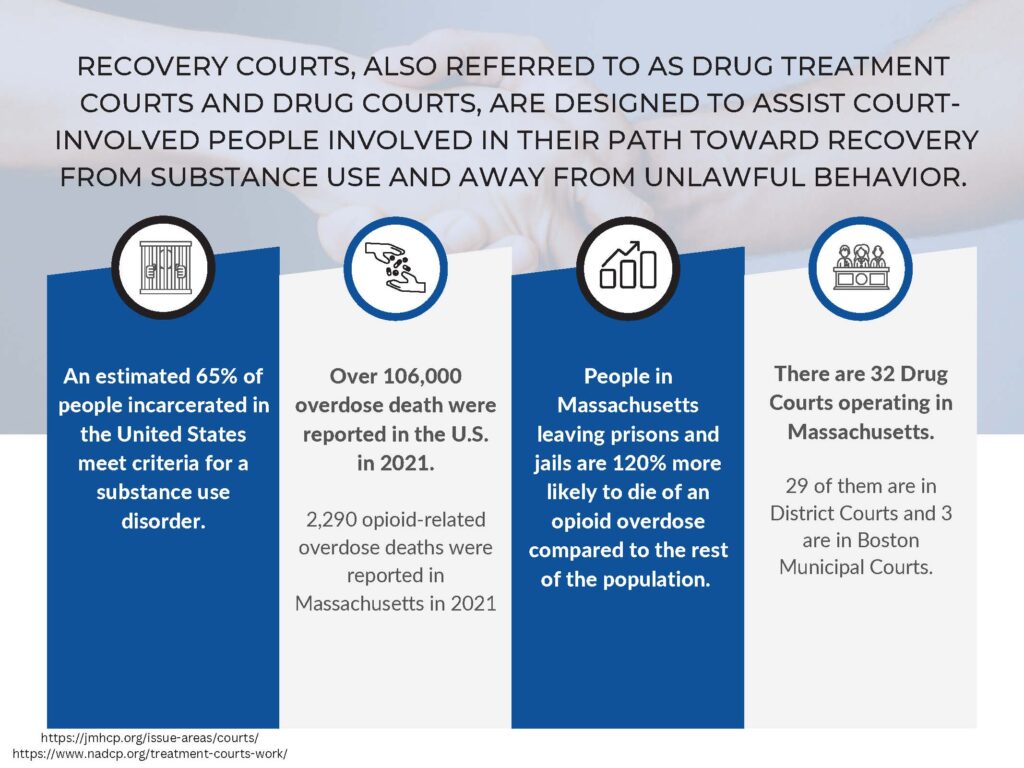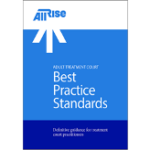
Recovery Courts, also referred to as Drug Treatment Courts and Drug Courts, address the behavioral health and social support needs of adults involved with the criminal-legal system. Recovery Courts are designed to assist court-involved people in their path toward recovery from substance use and away from unlawful behavior.
Target Population & Program Referrals
In Massachusetts, Recovery Courts serve people involved with the courts and probation who are at an elevated likelihood of continued unlawful behavior and meet the criteria for a substance use disorder. People can be referred to Recovery Court at two stages of system involvement through a wide variety of sources. Some of these referral sources include:
People with a case in District or Municipal Courts who are at sentencing or disposition:
- Self & Defense Counsel: People can consult with their defense counsel and inquire about Recovery Court. Defense counsel may also inquire with people about their interest in Recovery Court. If people are interested, Defense Counsel may recommend a Recovery Court screening to the court.
- Prosecutor: Prosecutors may make a Recovery Court screening recommendation to the court.
- Probation: Probation officers may make a Recovery Court screening recommendation to the court.
- Judge: Judges may make a Recovery Court screening recommendation.
People who are being supervised on Probation at a District or Municipal Court:
- Self & Probation Officers: People who are already on Probation can consult with their Probation Officer and inquire about Recovery Court. Probation Officers may make a Recovery Court screening recommendation for people they supervise.
- Self & Defense Counsel: People can consult with their defense counsel and inquire about Recovery Court. Often, this referral process arises when a violation notice is issued to people on Probation. When a violation notice is issued, Defense Counsel may also inquire with people about their interest in Recovery Court.
- Prosecutor: Prosecutors may make a Recovery Court screening recommendation to the court at a violation of probation hearing.
- Probation: Probation officers may make a Recovery Court screening recommendation to the court at a violation of probation hearing.
- Judge: Judges may make a Recovery Court screening recommendation at a violation of probation hearing.
Recovery Court Eligibility & Screening Process
Participation in Massachusetts Recovery Courts is voluntary. This means that people who are referred to Recovery Court and meet eligibility criteria for the program must agree to participate in the program and agree to comply with program requirements. Before people are presented with the option to participate, Recovery Court staff will meet with individuals to inform them of program requirements and determine their eligibility.
In most cases, a Probation Officer working with a Recovery Court will meet with potential participants to screen and assess for eligibility criteria that pertain to their legal system involvement and the likelihood of continued unlawful behavior. The Probation Officer will also review the Recovery Court participant handbook and provide information about the program requirements and structure. A Clinician working with a Recovery Court will also meet potential participants to screen and assess for eligibility criteria related to their substance use. People interested in the program will be invited to a Recovery Court session so that they can observe the program in action before they decide to participate.
If a person is determined to be eligible for Recovery Court and voluntarily agrees to participation, then the person will be officially entered into the program and Recovery Court will be included in their Conditions of Probation.
Drug Court Program Description
Recovery Courts follow a multiphase structure. Initial phases involve assessment and stabilization services, as the Recovery Court team works to assess participants’ treatment and rehabilitation needs and provide stabilization services.
Subsequent phases focus on intensive supervision and treatment, as participants receive supervision intended to monitor behavior in the community, meet frequently with a judge, and receive treatment, which sometimes includes residential treatment.
Later phases involve relapse prevention and the addition of complementary treatment and support services targeting areas of need in life domains beyond substance use, such as education and employment.
Finally, participants enter a maintenance phase, as subsequent progress is monitored, supervision lessens, and participants prepare to transition out of the program.
Recovery Court operations are overseen by a multidisciplinary team of professionals who work together to assist participants in their path toward recovery from substance use and away from unlawful behavior. Typically, the Recovery Court Team includes a Judge, Probation Officer, Clinician, Coordinator, Defense Counsel, Prosecution, Community Justice Support Center Team Member, and may also include a Law Enforcement Officer.
Throughout the Recovery Court program, participants attend status hearings with a Judge. During these status hearings, the Judge will monitor participant progress in the program and participants have an opportunity to speak directly to the Judge about their progress.
Massachusetts Recovery Court Locations
Massachusetts has 32 Recovery Courts, 29 in District Courts, and 3 in Boston Municipal Courts.
The District Court operates 29 adult drug court sessions in:
The Boston Municipal Court holds 3 drug court sessions in:
Additional Information & Resources
For more information on Massachusetts Drug Courts, please see the Drug Court Manual available to download here:



